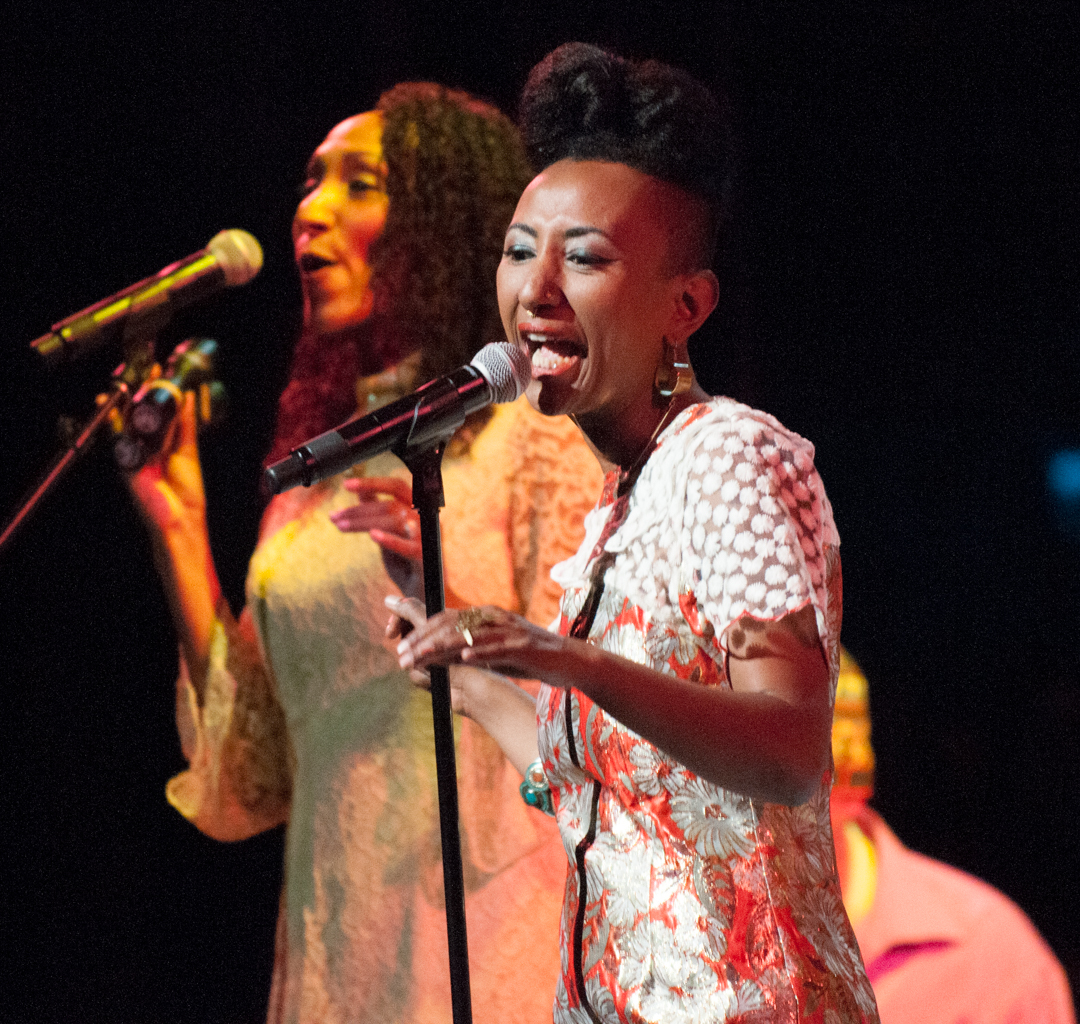Blog March 30, 2016
Concert Review: Africa Now! at the Apollo
Hundreds of avid fans flocked to Harlem's Apollo Theater on March 26 for a taste of some of the freshest tunes coming out of the African continent. For four years running, the historic venue has hosted an annual Africa Now! concert, showcasing emerging and established African musicians. Following 2015's South African-centered production, this installment presented music from across the continent: Zimbabwe, Sudan, Niger and Ghana. With each act allotted less than 30 minutes on stage, the show felt a bit rushed, but the performances that filled the house were highly impressive and an excellent showcase of the range of African music being created today, from Bombino's rocking blues riffs to Jojo Abot's arty, dancehall-inspired grooves. Sahr Ngaujah, who played Fela Kuti in the Tony award-winning Fela!, played host this night, dressed to a T, charming the audience with his quips in between sets. DJ Underdog filled the spaces, spinning a mix of Nigerian Afrobeats and Ghanaian azonto that was absolutely on point.
[caption id="attachment_28404" align="aligncenter" width="640"]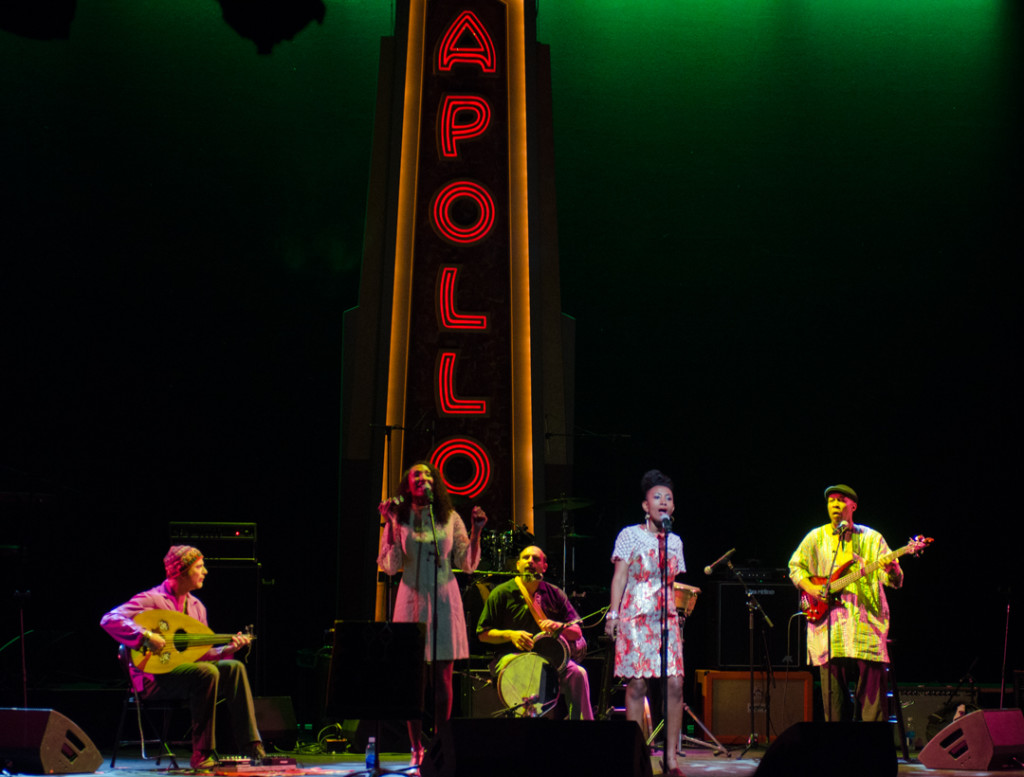 Alsarah and the Nubatones[/caption]
[caption id="attachment_28401" align="aligncenter" width="640"]
Alsarah and the Nubatones[/caption]
[caption id="attachment_28401" align="aligncenter" width="640"]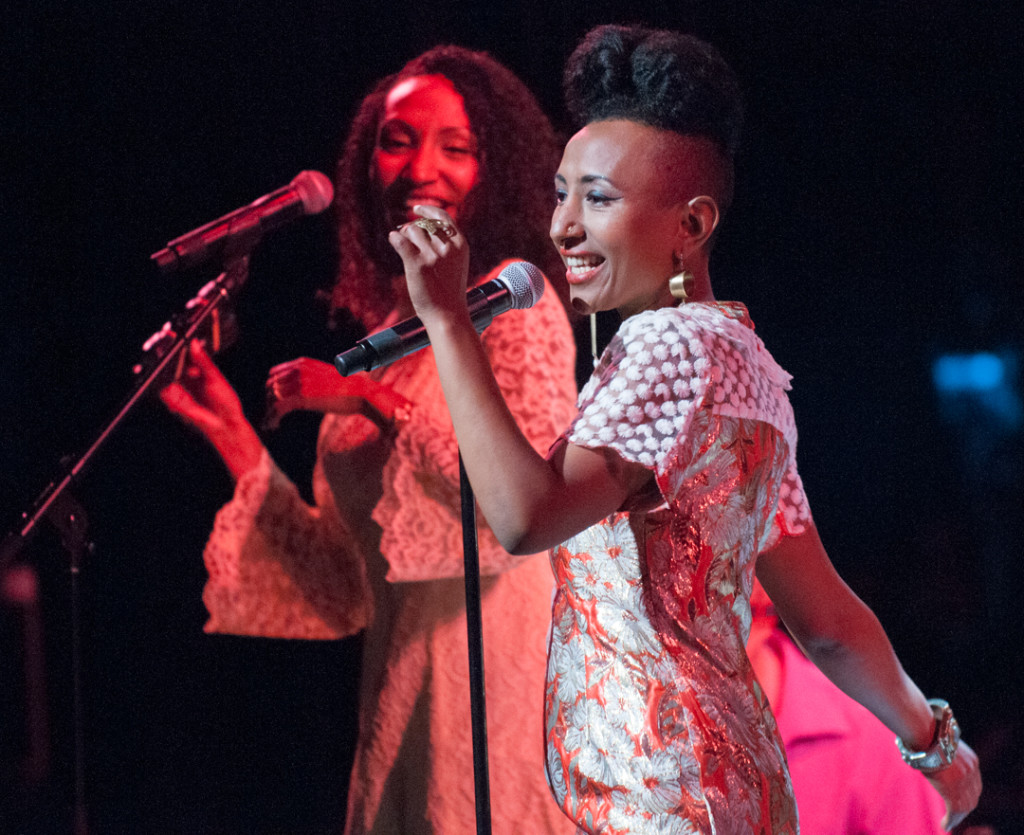 Alsarah and the Nubatones[/caption]
[caption id="attachment_28402" align="aligncenter" width="640"]
Alsarah and the Nubatones[/caption]
[caption id="attachment_28402" align="aligncenter" width="640"]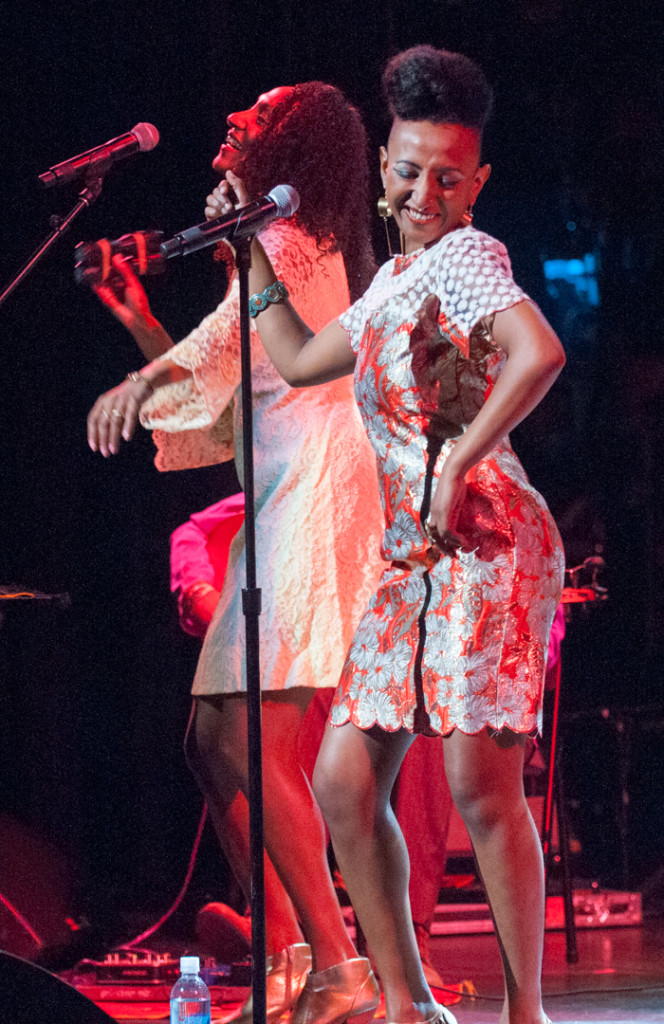 Alsarah and the Nubatones[/caption]
First up, Sudanese-born Alsarah and her Brooklyn-based group the Nubatones hit the stage with their self-described "East African retro pop." Alsarah was joined by her sister on vocals and a trio on oud, percussion and bass. The group's music emerges out of the songs of Nubia, where Alsarah has roots: a region that saw forced migration after the flooding that followed Egypt's construction of the Aswan Dam on the Nile River. Alsarah is an activist and ethnomusicologist as well, working with artists in the Nile Project to use the many musics of the Nile to raise awareness of the environmental and social struggles that surround the mighty life-giving river. The music that she creates with the Nubatones pays homage to her home in melody, instrumentation and lyrics, but augments the music, fusing it with elements of funk. Their sound is, however, undoubtedly retro, harkening back to the fusion happening in Khartoum in the '70s and '80s with artists like Khogali Osman. Alsarah's mellifluous soprano paired well with her sister's harmonies and her band's mellow oud and agile dumbek. Their song "Habibi Taal" was a sure winner, upping the fun quotient several notches and getting the packed house on their feet and dancing for the first time.
[caption id="attachment_28413" align="aligncenter" width="640"]
Alsarah and the Nubatones[/caption]
First up, Sudanese-born Alsarah and her Brooklyn-based group the Nubatones hit the stage with their self-described "East African retro pop." Alsarah was joined by her sister on vocals and a trio on oud, percussion and bass. The group's music emerges out of the songs of Nubia, where Alsarah has roots: a region that saw forced migration after the flooding that followed Egypt's construction of the Aswan Dam on the Nile River. Alsarah is an activist and ethnomusicologist as well, working with artists in the Nile Project to use the many musics of the Nile to raise awareness of the environmental and social struggles that surround the mighty life-giving river. The music that she creates with the Nubatones pays homage to her home in melody, instrumentation and lyrics, but augments the music, fusing it with elements of funk. Their sound is, however, undoubtedly retro, harkening back to the fusion happening in Khartoum in the '70s and '80s with artists like Khogali Osman. Alsarah's mellifluous soprano paired well with her sister's harmonies and her band's mellow oud and agile dumbek. Their song "Habibi Taal" was a sure winner, upping the fun quotient several notches and getting the packed house on their feet and dancing for the first time.
[caption id="attachment_28413" align="aligncenter" width="640"]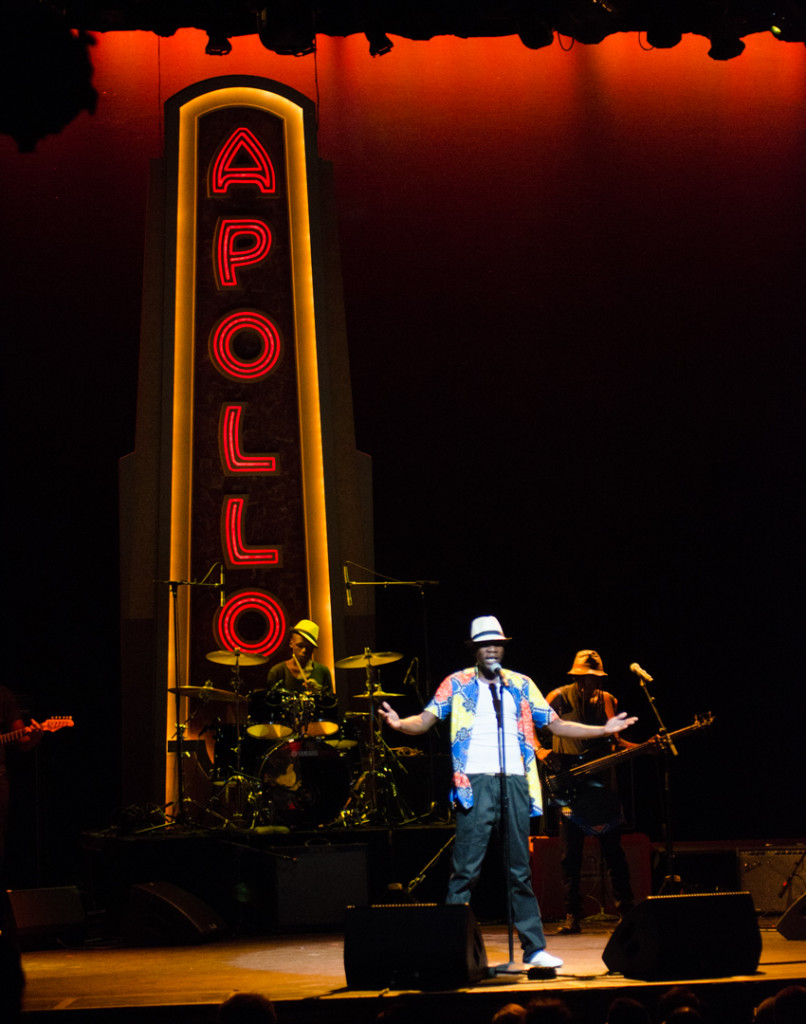 Mokoomba[/caption]
[caption id="attachment_28412" align="aligncenter" width="640"]
Mokoomba[/caption]
[caption id="attachment_28412" align="aligncenter" width="640"]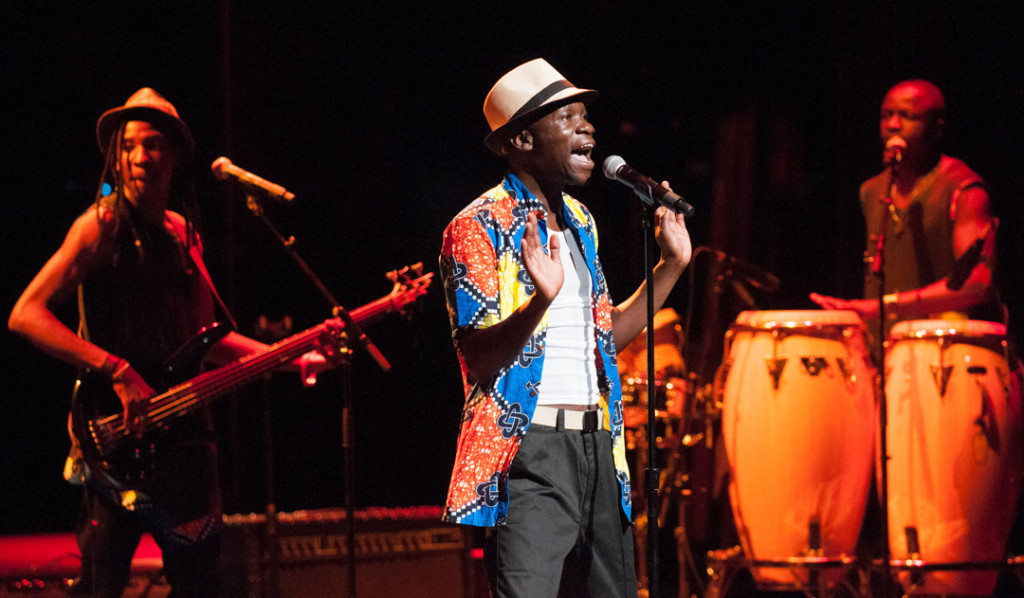 Mokoomba[/caption]
[caption id="attachment_28414" align="aligncenter" width="640"]
Mokoomba[/caption]
[caption id="attachment_28414" align="aligncenter" width="640"]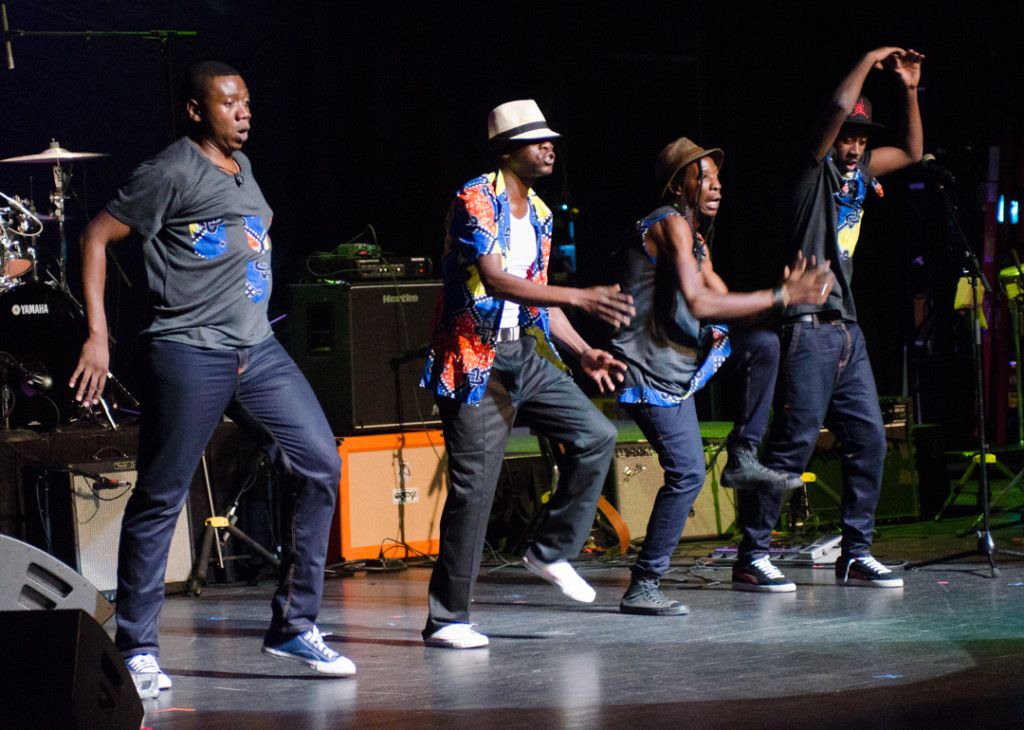 Mokoomba[/caption]
The Zimbabwean group Mokoomba presented possibly the most stunning set of the night. These six friends from the Tonga region of Zimbabwe (home to Victoria Falls) shook the hall with their abundant grooves, tight harmonies, and remarkably dynamic sound. Led by the fierce, versatile voice of Mathias Muzaza, they slid deftly between genres, emotions, and languages without ever feeling jumpy or disconnected, and always with the utmost skill and polish. Mokoomba introduced themselves with "Masangango," a hard-hitting song about the hardships of Tonga initiation ceremonies, which all of the members went through as children. Muzaza stood stock still at the microphone in a bright shirt and tilted fedora as his voice erupted into a impassioned cry beautifully echoing Salif Keita, backed by a sound that could have come from Rokia Traoré. "Kum Kanda" followed in a very different spirit, with joyous harmonies and Muzaza and company dancing across the stage. The band brought down the house with their last number, a seriously funky soukous jam, as the musicians kwassa kwassa-ed on stage and Muzaza's voice took on the smooth crooning of Tabu Ley Rochereau. For those craving more Mokoomba after their frustratingly short set, their new album Luyando will be out later this year.
[embed]https://www.youtube.com/watch?v=hlR3vAWtRlg[/embed]
[caption id="attachment_28407" align="aligncenter" width="640"]
Mokoomba[/caption]
The Zimbabwean group Mokoomba presented possibly the most stunning set of the night. These six friends from the Tonga region of Zimbabwe (home to Victoria Falls) shook the hall with their abundant grooves, tight harmonies, and remarkably dynamic sound. Led by the fierce, versatile voice of Mathias Muzaza, they slid deftly between genres, emotions, and languages without ever feeling jumpy or disconnected, and always with the utmost skill and polish. Mokoomba introduced themselves with "Masangango," a hard-hitting song about the hardships of Tonga initiation ceremonies, which all of the members went through as children. Muzaza stood stock still at the microphone in a bright shirt and tilted fedora as his voice erupted into a impassioned cry beautifully echoing Salif Keita, backed by a sound that could have come from Rokia Traoré. "Kum Kanda" followed in a very different spirit, with joyous harmonies and Muzaza and company dancing across the stage. The band brought down the house with their last number, a seriously funky soukous jam, as the musicians kwassa kwassa-ed on stage and Muzaza's voice took on the smooth crooning of Tabu Ley Rochereau. For those craving more Mokoomba after their frustratingly short set, their new album Luyando will be out later this year.
[embed]https://www.youtube.com/watch?v=hlR3vAWtRlg[/embed]
[caption id="attachment_28407" align="aligncenter" width="640"]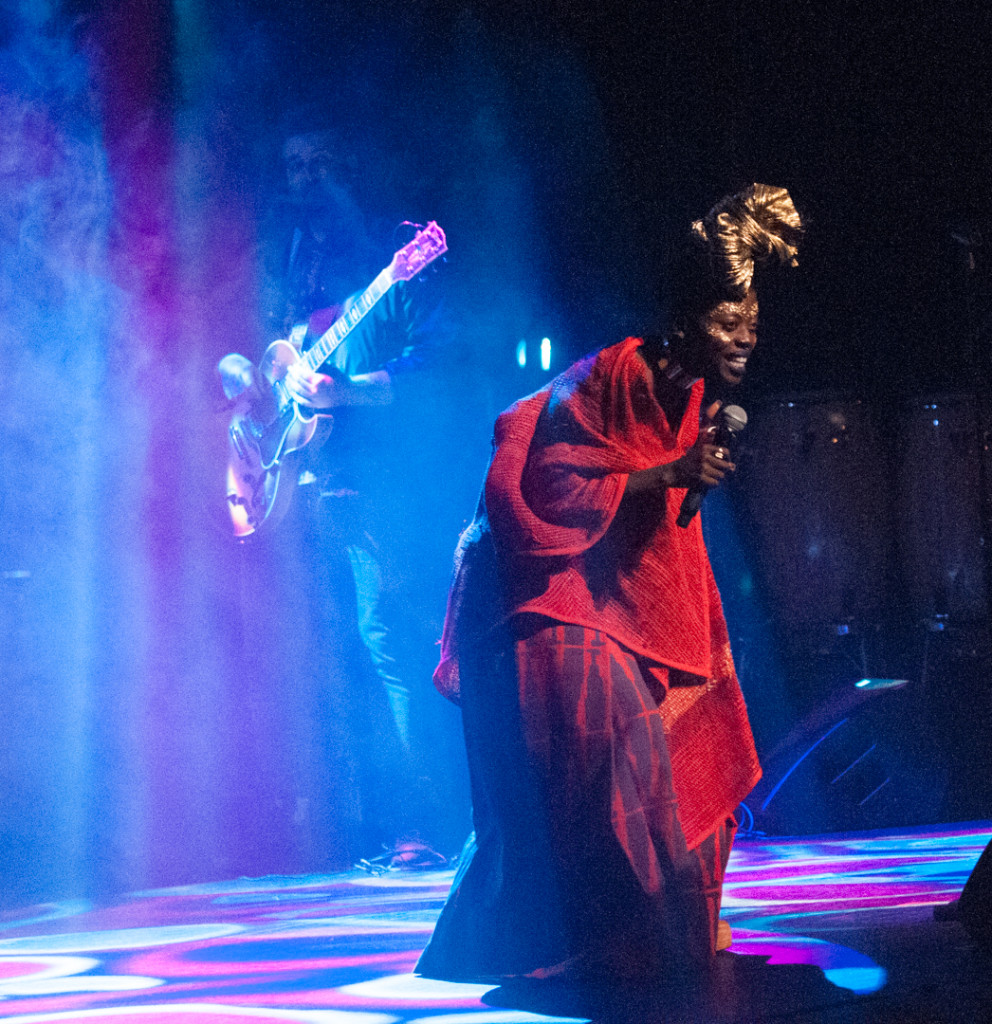 Jojo Abot[/caption]
[caption id="attachment_28406" align="aligncenter" width="640"]
Jojo Abot[/caption]
[caption id="attachment_28406" align="aligncenter" width="640"]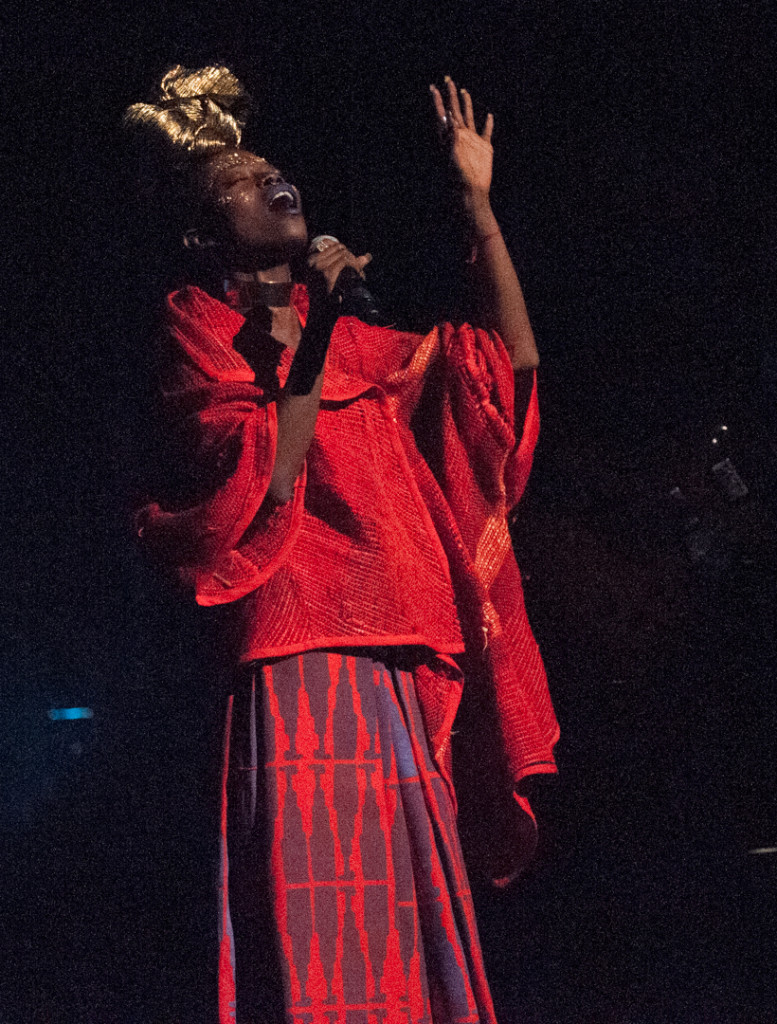 Jojo Abot[/caption]
[caption id="attachment_28405" align="aligncenter" width="640"]
Jojo Abot[/caption]
[caption id="attachment_28405" align="aligncenter" width="640"]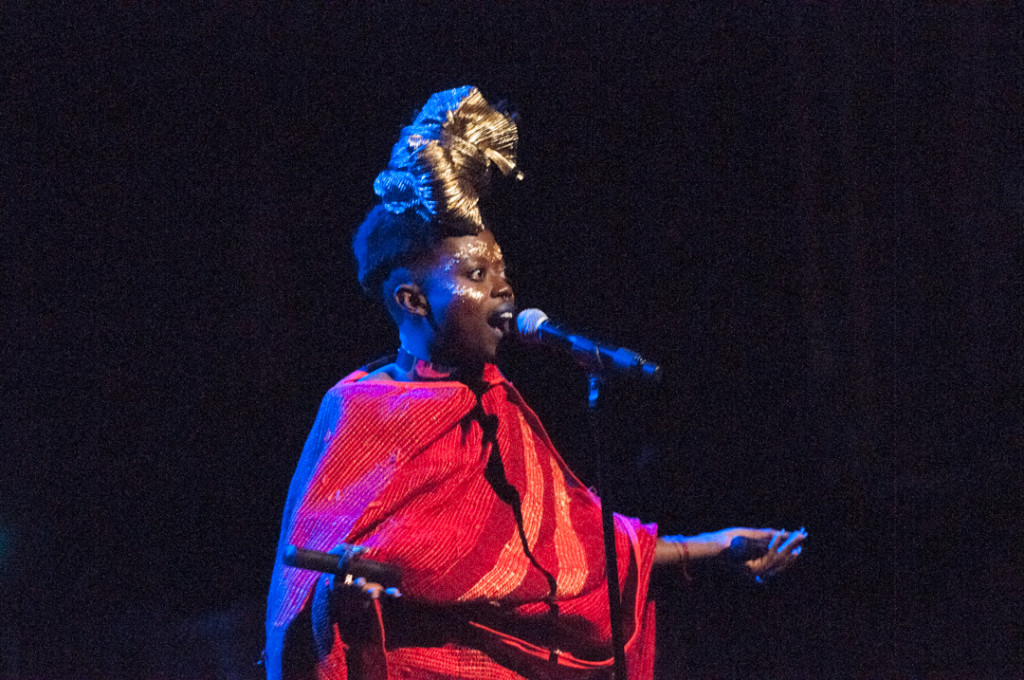 Jojo Abot[/caption]
Following Mokoomba's sparkling performance, the blossoming Ghanaian artist Jojo Abot, draped beautifully in earthen reds and blues and crowned with gold, took to a shadowed, smoky stage. Although the dimmed lighting kept her band in darkness the entire set, it did lend an air of intrigue to the already intriguing singer. Abot's piercing eyes and uncanny voice captivated, fluttering above minimal, echoing beats reminiscent of the French-Cuban group Ibeyi. From her first song, "To Li," it's clear Abot has more than a little dancehall in her voice, jumping octaves in one word and shaping her syllables somewhere in between patois and her native Ewe, which she mostly sings in. Her voice is hard to pin down, meandering and dynamic, with shades of both Erykah Badu and Björk. She is an artist to the fullest, also creating as an actress, model and designer, which is yet another reason to believe Accra is becoming a hub for pioneering music and art. In an interview with Okayafrica, Abot mentions, among others, Wanlov and M3NSA, also known as the controversial and cutting edge Ghanaian musical duo FOKN Bois, as helping her find her musical self, and connected her to the creative scene in Ghana when she moved back from Brooklyn several years ago. Abot is well placed and well skilled to make a splash with her art on the global scene. At the Apollo, she closed by calling the audience out of their seats to dance to "Stop the Violence," a solid tune with a jazzy house beat that really created some magic.
[caption id="attachment_28408" align="aligncenter" width="640"]
Jojo Abot[/caption]
Following Mokoomba's sparkling performance, the blossoming Ghanaian artist Jojo Abot, draped beautifully in earthen reds and blues and crowned with gold, took to a shadowed, smoky stage. Although the dimmed lighting kept her band in darkness the entire set, it did lend an air of intrigue to the already intriguing singer. Abot's piercing eyes and uncanny voice captivated, fluttering above minimal, echoing beats reminiscent of the French-Cuban group Ibeyi. From her first song, "To Li," it's clear Abot has more than a little dancehall in her voice, jumping octaves in one word and shaping her syllables somewhere in between patois and her native Ewe, which she mostly sings in. Her voice is hard to pin down, meandering and dynamic, with shades of both Erykah Badu and Björk. She is an artist to the fullest, also creating as an actress, model and designer, which is yet another reason to believe Accra is becoming a hub for pioneering music and art. In an interview with Okayafrica, Abot mentions, among others, Wanlov and M3NSA, also known as the controversial and cutting edge Ghanaian musical duo FOKN Bois, as helping her find her musical self, and connected her to the creative scene in Ghana when she moved back from Brooklyn several years ago. Abot is well placed and well skilled to make a splash with her art on the global scene. At the Apollo, she closed by calling the audience out of their seats to dance to "Stop the Violence," a solid tune with a jazzy house beat that really created some magic.
[caption id="attachment_28408" align="aligncenter" width="640"]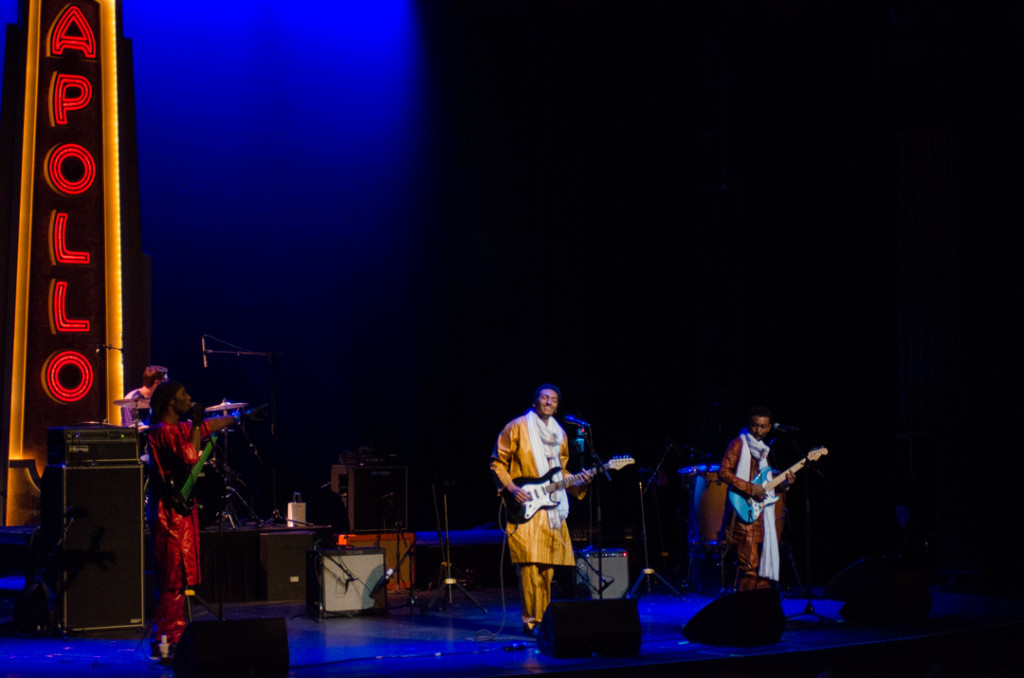 Bombino[/caption]
[caption id="attachment_28409" align="aligncenter" width="640"]
Bombino[/caption]
[caption id="attachment_28409" align="aligncenter" width="640"]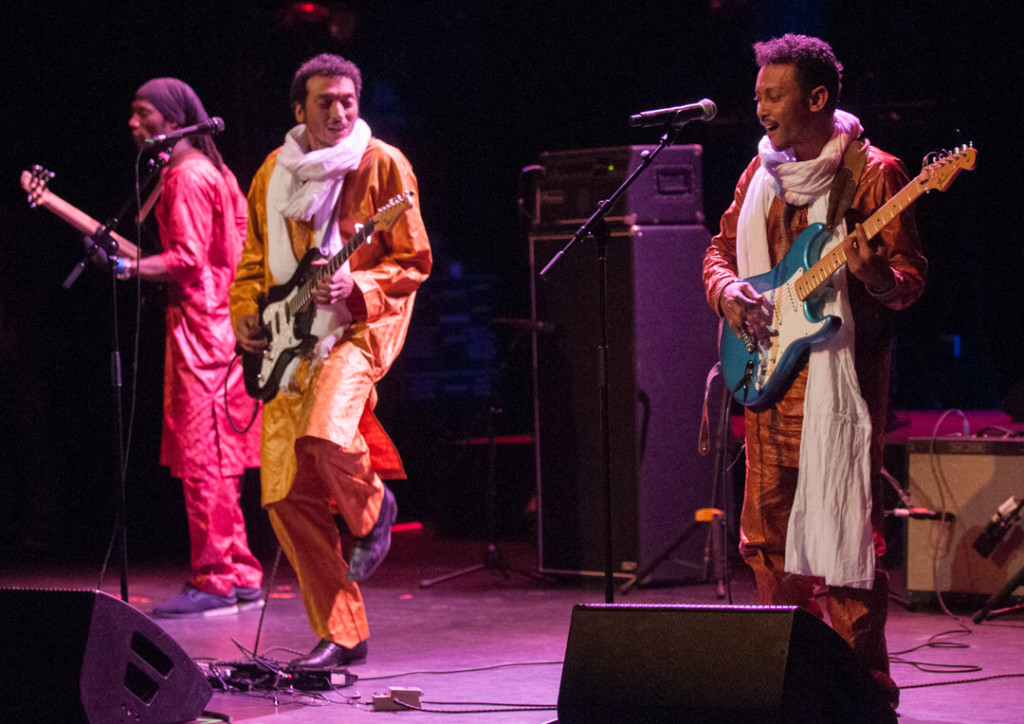 Bombino[/caption]
[caption id="attachment_28410" align="aligncenter" width="640"]
Bombino[/caption]
[caption id="attachment_28410" align="aligncenter" width="640"]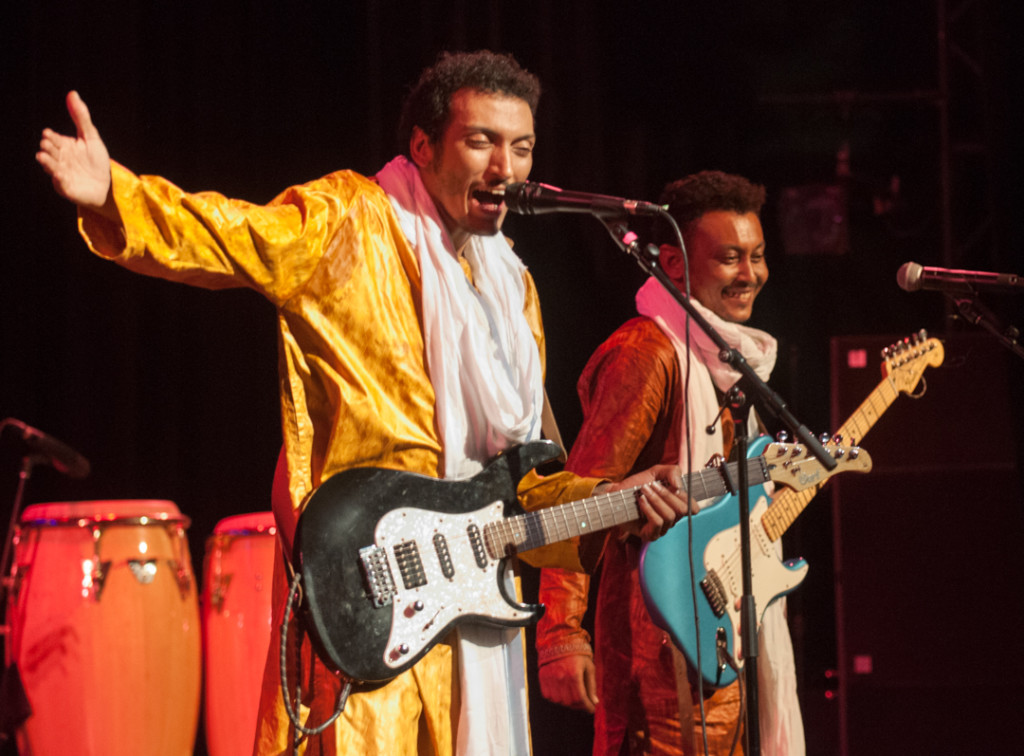 Bombino[/caption]
[caption id="attachment_28411" align="aligncenter" width="640"]
Bombino[/caption]
[caption id="attachment_28411" align="aligncenter" width="640"]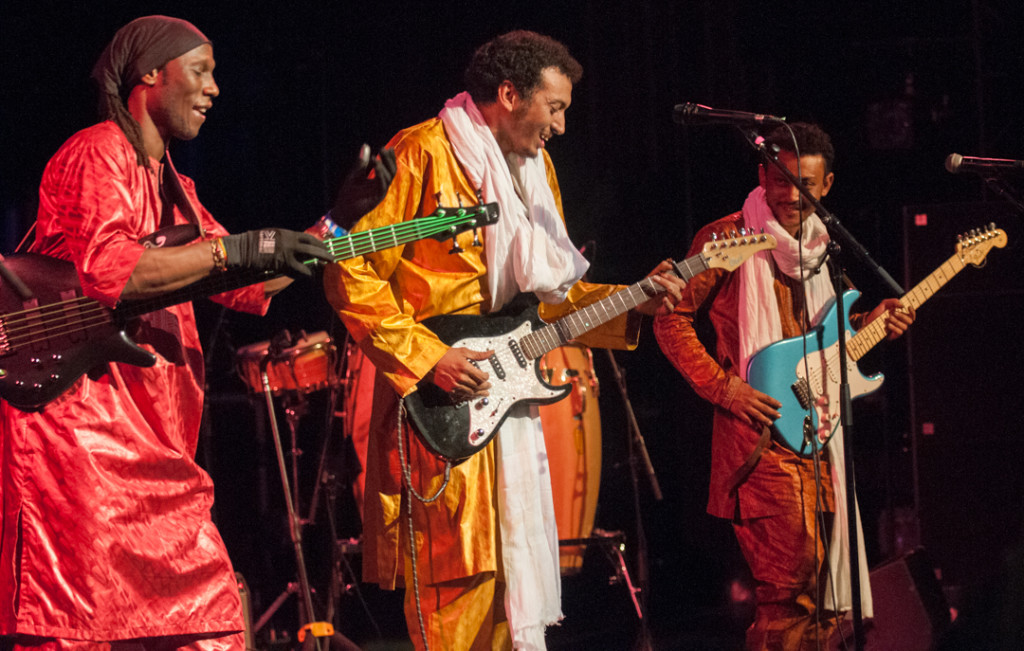 Bombino[/caption]
The headliner was Niger's Omara Moctar, also known as Bombino, with his slick guitar work and tumbling Tuareg rhythms. Bombino's music has penetrated the international music world more than the previous acts, in part due to the familiarity of pentatonic guitar riffs to blues and rock fans, and in part to the production of his album Nomad by Black Keys rocker Dan Auerbach. Of course, Bombino's proficiency on guitar is the engine behind his success, joining the ranks of Tuareg guitarists from the Sahara, most notably the Malian group Tinariwen, all of whom were inspired by the guitar style of Dire Straits' Mark Knopfler. American drummer Cory Wilhelm propelled the music onwards with the loping, unfaltering beat of Tuareg rock as a guitarist and bassist joined Bombino to create a rich, electric flow of crisp, bluesy riffs. Their instruments bore no distortion or filters but gave the meandering licks straight ahead, which is all this kind of music really needs. Bombino's guitar technique too was unadorned: not wowing the crowd with lightning-fast fingers, but in the classic Tuareg rock manner, repeating a dense vamp, throwing in flourishes with the bending of notes or subtle changes in rhythm. Bombino's group tore up the hall with one fiery jam, accelerating to a frenetic but nimble torrent of notes. Keep an ear out for his album Azel, releasing in April.
All photos by Banning Eyre.
Bombino[/caption]
The headliner was Niger's Omara Moctar, also known as Bombino, with his slick guitar work and tumbling Tuareg rhythms. Bombino's music has penetrated the international music world more than the previous acts, in part due to the familiarity of pentatonic guitar riffs to blues and rock fans, and in part to the production of his album Nomad by Black Keys rocker Dan Auerbach. Of course, Bombino's proficiency on guitar is the engine behind his success, joining the ranks of Tuareg guitarists from the Sahara, most notably the Malian group Tinariwen, all of whom were inspired by the guitar style of Dire Straits' Mark Knopfler. American drummer Cory Wilhelm propelled the music onwards with the loping, unfaltering beat of Tuareg rock as a guitarist and bassist joined Bombino to create a rich, electric flow of crisp, bluesy riffs. Their instruments bore no distortion or filters but gave the meandering licks straight ahead, which is all this kind of music really needs. Bombino's guitar technique too was unadorned: not wowing the crowd with lightning-fast fingers, but in the classic Tuareg rock manner, repeating a dense vamp, throwing in flourishes with the bending of notes or subtle changes in rhythm. Bombino's group tore up the hall with one fiery jam, accelerating to a frenetic but nimble torrent of notes. Keep an ear out for his album Azel, releasing in April.
All photos by Banning Eyre.
 Alsarah and the Nubatones[/caption]
[caption id="attachment_28401" align="aligncenter" width="640"]
Alsarah and the Nubatones[/caption]
[caption id="attachment_28401" align="aligncenter" width="640"] Alsarah and the Nubatones[/caption]
[caption id="attachment_28402" align="aligncenter" width="640"]
Alsarah and the Nubatones[/caption]
[caption id="attachment_28402" align="aligncenter" width="640"] Alsarah and the Nubatones[/caption]
First up, Sudanese-born Alsarah and her Brooklyn-based group the Nubatones hit the stage with their self-described "East African retro pop." Alsarah was joined by her sister on vocals and a trio on oud, percussion and bass. The group's music emerges out of the songs of Nubia, where Alsarah has roots: a region that saw forced migration after the flooding that followed Egypt's construction of the Aswan Dam on the Nile River. Alsarah is an activist and ethnomusicologist as well, working with artists in the Nile Project to use the many musics of the Nile to raise awareness of the environmental and social struggles that surround the mighty life-giving river. The music that she creates with the Nubatones pays homage to her home in melody, instrumentation and lyrics, but augments the music, fusing it with elements of funk. Their sound is, however, undoubtedly retro, harkening back to the fusion happening in Khartoum in the '70s and '80s with artists like Khogali Osman. Alsarah's mellifluous soprano paired well with her sister's harmonies and her band's mellow oud and agile dumbek. Their song "Habibi Taal" was a sure winner, upping the fun quotient several notches and getting the packed house on their feet and dancing for the first time.
[caption id="attachment_28413" align="aligncenter" width="640"]
Alsarah and the Nubatones[/caption]
First up, Sudanese-born Alsarah and her Brooklyn-based group the Nubatones hit the stage with their self-described "East African retro pop." Alsarah was joined by her sister on vocals and a trio on oud, percussion and bass. The group's music emerges out of the songs of Nubia, where Alsarah has roots: a region that saw forced migration after the flooding that followed Egypt's construction of the Aswan Dam on the Nile River. Alsarah is an activist and ethnomusicologist as well, working with artists in the Nile Project to use the many musics of the Nile to raise awareness of the environmental and social struggles that surround the mighty life-giving river. The music that she creates with the Nubatones pays homage to her home in melody, instrumentation and lyrics, but augments the music, fusing it with elements of funk. Their sound is, however, undoubtedly retro, harkening back to the fusion happening in Khartoum in the '70s and '80s with artists like Khogali Osman. Alsarah's mellifluous soprano paired well with her sister's harmonies and her band's mellow oud and agile dumbek. Their song "Habibi Taal" was a sure winner, upping the fun quotient several notches and getting the packed house on their feet and dancing for the first time.
[caption id="attachment_28413" align="aligncenter" width="640"] Mokoomba[/caption]
[caption id="attachment_28412" align="aligncenter" width="640"]
Mokoomba[/caption]
[caption id="attachment_28412" align="aligncenter" width="640"] Mokoomba[/caption]
[caption id="attachment_28414" align="aligncenter" width="640"]
Mokoomba[/caption]
[caption id="attachment_28414" align="aligncenter" width="640"] Mokoomba[/caption]
The Zimbabwean group Mokoomba presented possibly the most stunning set of the night. These six friends from the Tonga region of Zimbabwe (home to Victoria Falls) shook the hall with their abundant grooves, tight harmonies, and remarkably dynamic sound. Led by the fierce, versatile voice of Mathias Muzaza, they slid deftly between genres, emotions, and languages without ever feeling jumpy or disconnected, and always with the utmost skill and polish. Mokoomba introduced themselves with "Masangango," a hard-hitting song about the hardships of Tonga initiation ceremonies, which all of the members went through as children. Muzaza stood stock still at the microphone in a bright shirt and tilted fedora as his voice erupted into a impassioned cry beautifully echoing Salif Keita, backed by a sound that could have come from Rokia Traoré. "Kum Kanda" followed in a very different spirit, with joyous harmonies and Muzaza and company dancing across the stage. The band brought down the house with their last number, a seriously funky soukous jam, as the musicians kwassa kwassa-ed on stage and Muzaza's voice took on the smooth crooning of Tabu Ley Rochereau. For those craving more Mokoomba after their frustratingly short set, their new album Luyando will be out later this year.
[embed]https://www.youtube.com/watch?v=hlR3vAWtRlg[/embed]
[caption id="attachment_28407" align="aligncenter" width="640"]
Mokoomba[/caption]
The Zimbabwean group Mokoomba presented possibly the most stunning set of the night. These six friends from the Tonga region of Zimbabwe (home to Victoria Falls) shook the hall with their abundant grooves, tight harmonies, and remarkably dynamic sound. Led by the fierce, versatile voice of Mathias Muzaza, they slid deftly between genres, emotions, and languages without ever feeling jumpy or disconnected, and always with the utmost skill and polish. Mokoomba introduced themselves with "Masangango," a hard-hitting song about the hardships of Tonga initiation ceremonies, which all of the members went through as children. Muzaza stood stock still at the microphone in a bright shirt and tilted fedora as his voice erupted into a impassioned cry beautifully echoing Salif Keita, backed by a sound that could have come from Rokia Traoré. "Kum Kanda" followed in a very different spirit, with joyous harmonies and Muzaza and company dancing across the stage. The band brought down the house with their last number, a seriously funky soukous jam, as the musicians kwassa kwassa-ed on stage and Muzaza's voice took on the smooth crooning of Tabu Ley Rochereau. For those craving more Mokoomba after their frustratingly short set, their new album Luyando will be out later this year.
[embed]https://www.youtube.com/watch?v=hlR3vAWtRlg[/embed]
[caption id="attachment_28407" align="aligncenter" width="640"] Jojo Abot[/caption]
[caption id="attachment_28406" align="aligncenter" width="640"]
Jojo Abot[/caption]
[caption id="attachment_28406" align="aligncenter" width="640"] Jojo Abot[/caption]
[caption id="attachment_28405" align="aligncenter" width="640"]
Jojo Abot[/caption]
[caption id="attachment_28405" align="aligncenter" width="640"] Jojo Abot[/caption]
Following Mokoomba's sparkling performance, the blossoming Ghanaian artist Jojo Abot, draped beautifully in earthen reds and blues and crowned with gold, took to a shadowed, smoky stage. Although the dimmed lighting kept her band in darkness the entire set, it did lend an air of intrigue to the already intriguing singer. Abot's piercing eyes and uncanny voice captivated, fluttering above minimal, echoing beats reminiscent of the French-Cuban group Ibeyi. From her first song, "To Li," it's clear Abot has more than a little dancehall in her voice, jumping octaves in one word and shaping her syllables somewhere in between patois and her native Ewe, which she mostly sings in. Her voice is hard to pin down, meandering and dynamic, with shades of both Erykah Badu and Björk. She is an artist to the fullest, also creating as an actress, model and designer, which is yet another reason to believe Accra is becoming a hub for pioneering music and art. In an interview with Okayafrica, Abot mentions, among others, Wanlov and M3NSA, also known as the controversial and cutting edge Ghanaian musical duo FOKN Bois, as helping her find her musical self, and connected her to the creative scene in Ghana when she moved back from Brooklyn several years ago. Abot is well placed and well skilled to make a splash with her art on the global scene. At the Apollo, she closed by calling the audience out of their seats to dance to "Stop the Violence," a solid tune with a jazzy house beat that really created some magic.
[caption id="attachment_28408" align="aligncenter" width="640"]
Jojo Abot[/caption]
Following Mokoomba's sparkling performance, the blossoming Ghanaian artist Jojo Abot, draped beautifully in earthen reds and blues and crowned with gold, took to a shadowed, smoky stage. Although the dimmed lighting kept her band in darkness the entire set, it did lend an air of intrigue to the already intriguing singer. Abot's piercing eyes and uncanny voice captivated, fluttering above minimal, echoing beats reminiscent of the French-Cuban group Ibeyi. From her first song, "To Li," it's clear Abot has more than a little dancehall in her voice, jumping octaves in one word and shaping her syllables somewhere in between patois and her native Ewe, which she mostly sings in. Her voice is hard to pin down, meandering and dynamic, with shades of both Erykah Badu and Björk. She is an artist to the fullest, also creating as an actress, model and designer, which is yet another reason to believe Accra is becoming a hub for pioneering music and art. In an interview with Okayafrica, Abot mentions, among others, Wanlov and M3NSA, also known as the controversial and cutting edge Ghanaian musical duo FOKN Bois, as helping her find her musical self, and connected her to the creative scene in Ghana when she moved back from Brooklyn several years ago. Abot is well placed and well skilled to make a splash with her art on the global scene. At the Apollo, she closed by calling the audience out of their seats to dance to "Stop the Violence," a solid tune with a jazzy house beat that really created some magic.
[caption id="attachment_28408" align="aligncenter" width="640"] Bombino[/caption]
[caption id="attachment_28409" align="aligncenter" width="640"]
Bombino[/caption]
[caption id="attachment_28409" align="aligncenter" width="640"] Bombino[/caption]
[caption id="attachment_28410" align="aligncenter" width="640"]
Bombino[/caption]
[caption id="attachment_28410" align="aligncenter" width="640"] Bombino[/caption]
[caption id="attachment_28411" align="aligncenter" width="640"]
Bombino[/caption]
[caption id="attachment_28411" align="aligncenter" width="640"] Bombino[/caption]
The headliner was Niger's Omara Moctar, also known as Bombino, with his slick guitar work and tumbling Tuareg rhythms. Bombino's music has penetrated the international music world more than the previous acts, in part due to the familiarity of pentatonic guitar riffs to blues and rock fans, and in part to the production of his album Nomad by Black Keys rocker Dan Auerbach. Of course, Bombino's proficiency on guitar is the engine behind his success, joining the ranks of Tuareg guitarists from the Sahara, most notably the Malian group Tinariwen, all of whom were inspired by the guitar style of Dire Straits' Mark Knopfler. American drummer Cory Wilhelm propelled the music onwards with the loping, unfaltering beat of Tuareg rock as a guitarist and bassist joined Bombino to create a rich, electric flow of crisp, bluesy riffs. Their instruments bore no distortion or filters but gave the meandering licks straight ahead, which is all this kind of music really needs. Bombino's guitar technique too was unadorned: not wowing the crowd with lightning-fast fingers, but in the classic Tuareg rock manner, repeating a dense vamp, throwing in flourishes with the bending of notes or subtle changes in rhythm. Bombino's group tore up the hall with one fiery jam, accelerating to a frenetic but nimble torrent of notes. Keep an ear out for his album Azel, releasing in April.
All photos by Banning Eyre.
Bombino[/caption]
The headliner was Niger's Omara Moctar, also known as Bombino, with his slick guitar work and tumbling Tuareg rhythms. Bombino's music has penetrated the international music world more than the previous acts, in part due to the familiarity of pentatonic guitar riffs to blues and rock fans, and in part to the production of his album Nomad by Black Keys rocker Dan Auerbach. Of course, Bombino's proficiency on guitar is the engine behind his success, joining the ranks of Tuareg guitarists from the Sahara, most notably the Malian group Tinariwen, all of whom were inspired by the guitar style of Dire Straits' Mark Knopfler. American drummer Cory Wilhelm propelled the music onwards with the loping, unfaltering beat of Tuareg rock as a guitarist and bassist joined Bombino to create a rich, electric flow of crisp, bluesy riffs. Their instruments bore no distortion or filters but gave the meandering licks straight ahead, which is all this kind of music really needs. Bombino's guitar technique too was unadorned: not wowing the crowd with lightning-fast fingers, but in the classic Tuareg rock manner, repeating a dense vamp, throwing in flourishes with the bending of notes or subtle changes in rhythm. Bombino's group tore up the hall with one fiery jam, accelerating to a frenetic but nimble torrent of notes. Keep an ear out for his album Azel, releasing in April.
All photos by Banning Eyre.







